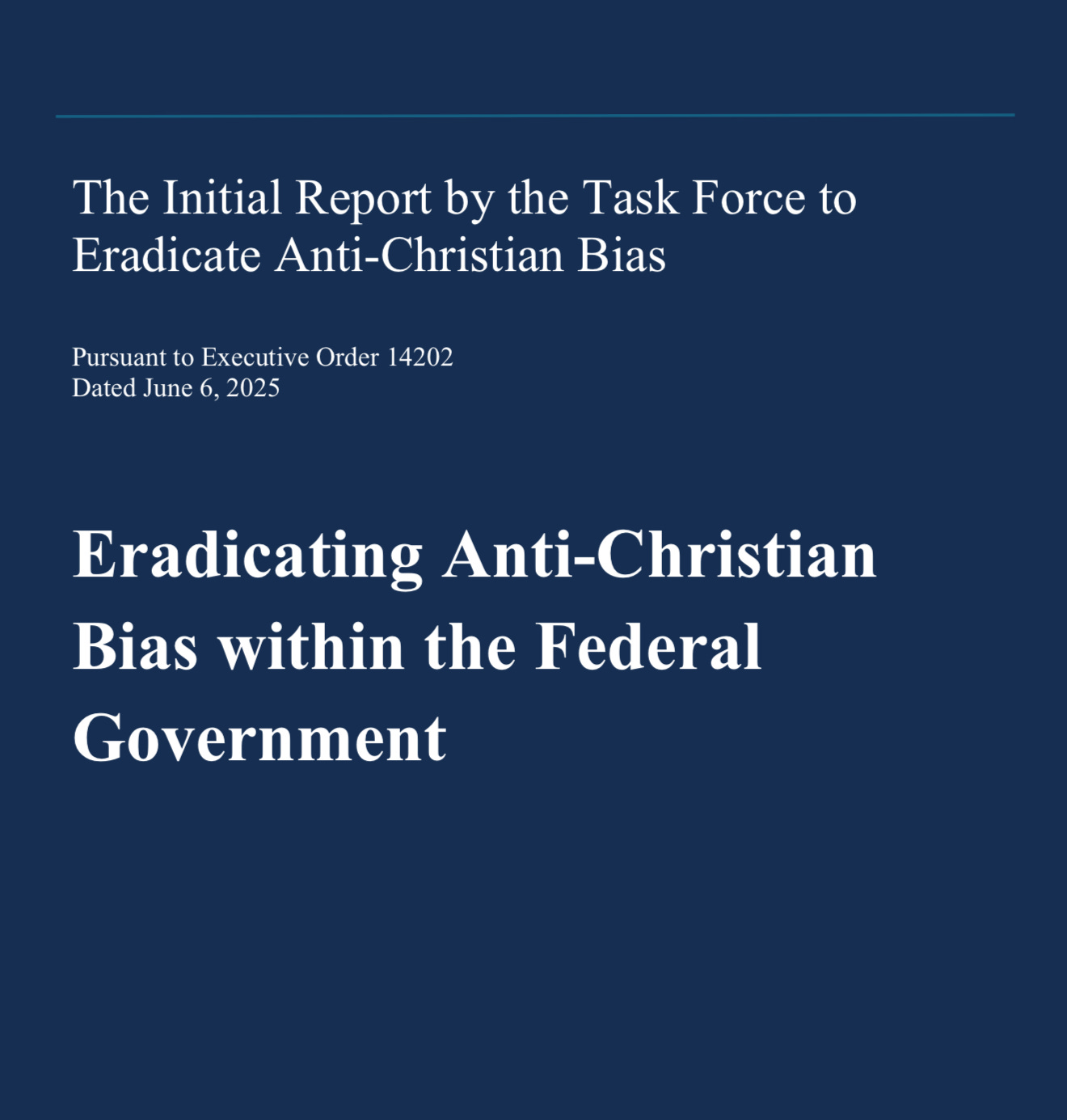(Illustration: Cover of report)
By Michael Peabody
In August, the Department of Justice released a 49-page document titled The Initial Report by the Task Force to Eradicate Anti-Christian Bias. Commissioned under Executive Order 14202, the report claims that during Joe Biden’s presidency, federal agencies marginalized Christians through policies on education, healthcare, employment, and holiday observances.
Link to report via Fox News: https://static.foxnews.com/foxnews.com/content/uploads/2025/09/anti-christian-bias-report.pdf
Some of the examples it presents are troubling. HUD scrubbed social media posts about Easter while leaving intact messages about Pride and Ramadan. The FBI’s Richmond Field Office circulated a memo classifying “radical-traditionalist Catholics” as domestic terrorism threats, with suggestions of infiltrating parishes. The Department of Justice prosecuted pro-life demonstrators under the FACE Act while ignoring attacks on churches and pregnancy centers. A Catholic hospital in Oklahoma was threatened with the loss of federal funding because of a sanctuary candle.
At its strongest, the report surfaces genuine constitutional concerns. When a government agency singles out one religious group for differential treatment, even in symbolic matters like holiday recognition, it risks sending the message that believers are unwelcome participants in civic life. The FBI memo in particular raised bipartisan alarm and has been formally disavowed. These incidents underscore the continuing need for vigilance in protecting free exercise.
Yet the report also stretches its claims. It treats any regulatory friction with religious entities as systemic bias. The sanctuary candle dispute is illustrative: regulators initially flagged safety concerns near oxygen equipment, the hospital challenged the decision, and an accommodation was reached. This hardly qualifies as evidence of entrenched hostility, though it is presented as such.
Legally, the Task Force is pushing a broad standard. Under current Free Exercise jurisprudence, not every adverse outcome constitutes unconstitutional discrimination. Neutral, generally applicable laws may burden religious practice without violating the Constitution. But the report treats nearly any adverse outcome as proof of bias. That risks turning equal protection into a demand for special preference.
The report leans heavily on recent Supreme Court precedents to buttress its argument. In Carson v. Makin (2022), the Court held that Maine could not exclude religious schools from tuition programs solely because they were religious. In Kennedy v. Bremerton School District (2022), the Court upheld a football coach’s right to pray visibly on the field. These decisions expand protections for religious exercise, but they do not erase the Establishment Clause. Agencies must walk a line: they cannot exclude religious claimants, but neither can they endorse one faith over others.
The Department of Justice’s approach to the FACE Act is a case in point. The report criticizes Biden’s DOJ for prosecuting pro-life demonstrators while refusing to apply the same law to attacks on churches. In response, Trump’s DOJ has announced it will now limit FACE Act prosecutions against protesters to “extraordinary circumstances” while prioritizing enforcement to protect houses of worship. That inversion may address concerns about selective enforcement, but it risks creating the very imbalance the Task Force claims to oppose.
The report is not a final word. It is the first installment, meant to set the stage for a more detailed submission due in February 2026. Between now and then, agencies are being directed to revise guidance, rewrite grant rules, and expand accommodations. The question is whether these changes will achieve neutrality or tilt the scales toward preference.
Religious liberty is at its strongest when it is evenly applied. If the Task Force report succeeds in reminding agencies that Christians, like all Americans, are entitled to equal treatment, it will have performed a valuable function. If it evolves into a program that privileges one faith above others, it will undermine the very liberty it claims to protect.
tags: trump task force report, anti-christian bias, executive order 14202, religious liberty law, free exercise clause
